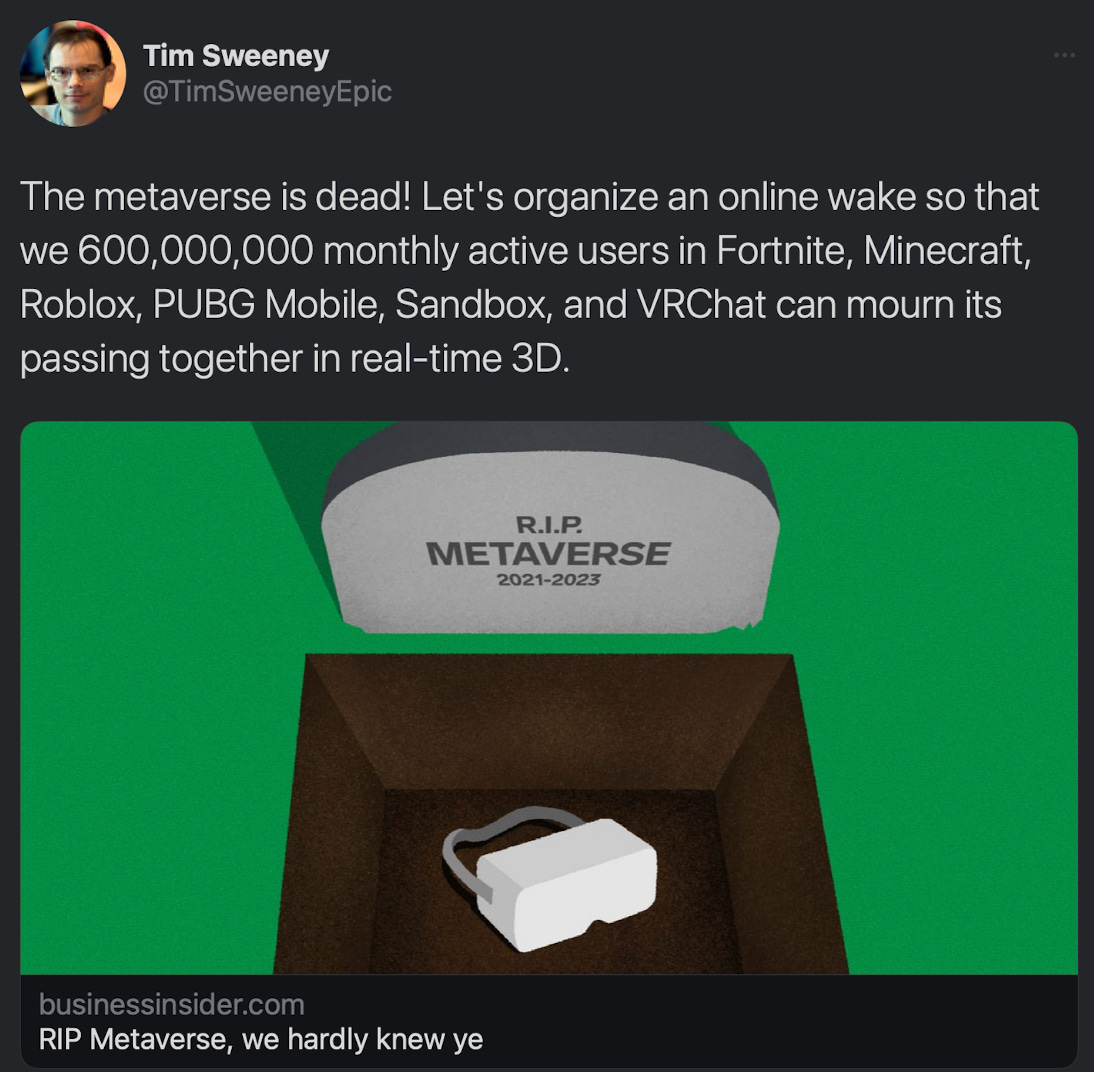Hey, Yon here! Welcome to Into The Metaverse. My mission is to help you understand what is the metaverse, how it will impact our lives, and what opportunities it unlocks. If you are a marketer, entrepreneur, investor or simply a curious professional, Into The Metaverse is for you. Subscribe to get access to every letter and podcast show that I publish.
I saw this tweet from Tim Sweeney (CEO of Epic Games) and wanted to double click.
During 2021-2022 there was a sense of euphoria that the metaverse is just around the corner. Roblox became a public company, Facebook changed its name to Meta, Fortnite had a Travis Scott virtual concert with 12 million+ people watching it, and the media made it sound like the metaverse is here. Well, fast forward to today and a few hype trends after, many in the media believe that the metaverse is dead. The simple truth is that the metaverse is not dead, because the metaverse is not even here (yet).
What we’re currently seeing is the emergence of game engines as a toolset for creating digital experiences in 3D for the masses by a new generation of creators. We’re seeing virtual worlds and 3D avatars becoming an ever growing part of kids and youth daily lives, which in turn drives a behavior of purchasing virtual goods and avatar items for their virtual identity. We’re seeing these virtual identities gradually becoming as important as their IRL identity. We’re seeing 3D digital spaces becoming the new hangout space and a next-gen neighborhood that continues to make the world feel very very small (in a good way). Similar to how social media (instagram, facebook, snapchat) captured the time and attention of young people between 2005-2015, since 2015 we’re seeing these new platforms (Roblox, Fortnite, Minecraft, VRChat, RecRoom, etc) becoming the Internet’s homepage for those born after 2005.
Epic Games was founded in 1991. Roblox and Unity were founded 2004. As big as the video games industry is, the “game engine” is now reaching its golden era, becoming a an engine of creation for so many different industries, from video games to automotive to cinema. Platforms like Roblox are becoming giant ecosystems that attract the most creative talent to design, build and publish games, experiences and virtual goods while they are still in high-school, and sometimes even younger. While we may need to explain the metaverse to 35+ year old executives, reporters, investors and marketers, we really don’t need to explain the metaverse to a 14 year-old girl in Columbus, Ohio - for her (and her generation) the metaverse is already here!
The concept of the metaverse has been around for decades and while we are in the very nascent stages of its evolution, the recent advances in game engine technology, the growing popularity of virtual worlds and video games, and the rapid adoption of 3D avatars as a vehicle for human creativity, expression and connection have led to where we are today.
We are all on the way of 3D virtual worlds becoming a key pillar of the what the Internet might look like in the next 10-15 years - massive, interconnected and persistent virtual worlds that are powered by virtual economies with millions of people who express themselves through 3D avatars in a way that merges reality with fantasy and transcends our physical boundaries.
Let’s build it.
Yon is the founder of CEO of Supersocial, an innovator and leading developer, publisher and technology company focused on virtual worlds. Thank you for subscribing to Into The Metaverse. We grow when readers who appreciate our work spread the word.






I totally agree that 3D virtual worlds will be a key pillar of our future. I'd argure that in many industries, we are seeing a lot of this already ...